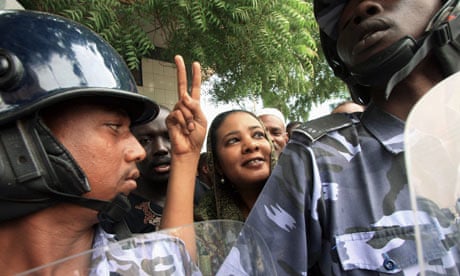Once again, Sudan's arbitrary sharia laws are causing controversy. Last month Intisar Sharif Abdullah, a young mother, was found guilty of adultery and sentenced to death by stoning in Khartoum. She had given birth to a child that was allegedly not her husband's, and both she and her five-month-old baby are now in Omdurman prison.
This alone, is enough to provoke outrage, but on closer inspection, it appears that the woman in question had a poor command of the Arabic language, her "confession" was made under duress, she was initially tried without access to a lawyer and her brother's testimony constituted most of the evidence. The man with whom she allegedly had committed adultery denied the allegations and was thus set free.
This is the latest instalment in a random application of an Islamic law that governs the country in principle, but very rarely in practice. Like many Arab countries, Sudan has a constitution that is not purely based on sharia law, but has some language to indicate that religious law is the basis and guiding spirit. In effect, this is a way of paying lip service to religion for the government to gain legitimacy, while avoiding accusations of secularism in a conservative society.
Most importantly, it is a potent tool that allows the government to apply punishment harshly (but inconsistently) whenever it feels the need. It also empowers individual members of the security forces and ordinary citizens who may be motivated by personal reasons to invoke the emotive power of religious offence.
The result is that the threat is always there, but rarely the execution. I have not been able to find a record of a single case of death by stoning for adultery in the modern annals of Sudanese law, despite the fact that some sentences were handed out.
This is a familiar pattern. Some hapless individual is caught and a zealous judiciary, empowered by the letter of the law, passes judgment. This is then followed by an outcry, the government defends the verdict as a sovereign right, then "magnanimously" commutes the sentence or the courts overturn it on appeal.
In the meantime, the defendant – who in adultery cases is almost always female – suffers incarceration, public humiliation and psychological torture. In the case of Intisar Abdullah we see this perfect storm, exacerbated by her youth, illiteracy, poverty, lack of advocacy or access to the media. Until this week, there had been little to no coverage of her case in the local press.
Ironically, in its haste to apply some chastisement and its unstudied application of religious law, the Sudanese judiciary almost always violates the basic tenets of sharia or fabricates some tenuous connection to modern-day "crimes".
The execution of the Islamic thinker Mahmoud Mohamed Taha in 1985 for the absurd charge of apostasy still remains one of the most farcical miscarriages of both religious and civil justice in the country's history.
In the Lubna Hussein case, the (eventually commuted) sentence of lashing was for wearing trousers – an offence that not even the Qur'an or other sources of religious law had foreseen and legislated against.
In the case of Intisar Abdullah, her lawyer told me there are at least five clear legal violations of sharia law that the court committed, the most serious being that her poor command of the Arabic language invalidated her confession. With regard to the actual sentence, Islam outlaws the execution of nursing mothers. Her lawyer also said that "serious crimes that have a sentence of 10 years or more, or are punishable by death, are supposed to be limited by stricter conditions and burdens of proof according to the penal code".
This haphazard mess of a legal system reflects a profound tension in Sudanese society between conservative, loosely religious values, and a mainstream resistance to the more hardcore Islamic penal law (or hudud). In conversations with people in Khartoum this past week, all expressed a deep concern over the stoning punishment, saying it was "alien" to Sudanese society. It is something that almost 25 years of forcibly injecting religious rhetoric into public life has failed to change.
Several Sudanese activists have taken her case, spreading the word and campaigning for her release. International pressure is also rising, but within the country itself, there is increasing concern that the legal confusion resulting from a penal code that incorporates cherry-picked religious penalties is claiming too many victims.

